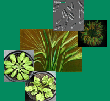| Harada, E; von Roepenack-Lahaye, E; Clemens, S: A cyanobacterial protein with similarity to phytochelatin synthases catalyzes the conversion of glutathione to -glutamylcysteine and lacks phytochelatin synthase activity, Phytochemistry, 65, 3179-3185 (2004), doi:10.1016/j.phytochem.2004.09.017 | |
| Abstract: Phytochelatins are glutathione-derived, non-translationally synthesized peptides essential for cadmium and arsenic detoxification in plant, fungal and nematode model systems. Recent sequencing programs have revealed the existence of phytochelatin synthase-related genes in a wide range of organisms that have not been reported yet to produce phytochelatins. Among those are several cyanobacteria. We have studied one of the encoded proteins (alr0975 from Nostoc sp. strain PCC 7120) and demonstrate here that it does not possess phytochelatin synthase activity. Instead, this protein catalyzes the conversion of glutathione to γ-glutamylcysteine. The thiol spectrum of yeast cells expressing alr0975 shows the disappearance of glutathione and the formation of a compound that by LC–MSMS analysis was unequivocally identified as γ-glutamylcysteine. Purified recombinant protein catalyzes the respective reaction. Unlike phytochelatin synthesis, the conversion of glutathione to γ-glutamylcysteine is not dependent on activation by metal cations. No evidence was found for the accumulation of phytochelatins in cyanobacteria even after prolonged exposure to toxic Cd2+ concentrations. Expression of alr0975 was detected in Nostoc sp. cells with an antiserum raised against the protein. No indication for a responsiveness of expression to toxic metal exposure was found. Taken together, these data provide further evidence for possible additional functions of phytochelatin synthase-related proteins in glutathione metabolism and provide a lead as to the evolutionary history of phytochelatin synthesis. |

Letzte Änderung 17.05.2021

